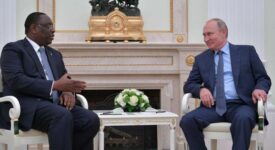Global cases of coronavirus reached the grim milestone of two million on Tuesday (14 April) as lockdowns continued, were extended or in some cases reduced in nations across the world, all with the aim to slow the spread of the virus. The UK announced that more than 11,000 people have died just one day after the country’s Prime Minister, Boris Johnson, was discharged from hospital where he was suffering with COVID-19. In France, President Emmanuel Macron has announced a month-long extension to country’s nationwide lockdown lasting until 11 May. He acknowledged the sacrifices already made but said France had to go further to save lives, but the period following this deadline, Macron said, would see a gradual easing of restrictions, though they will continue in many walks of life until the summer at least. Macron’s televized address came amid mounting concern over the social and economic consequences of the pandemic in France, as well as the short supply of medical equipment across the country.
Meanwhile, lockdown rules were relaxed in other badly-affected states, including in Spain where employees in some industries were allowed to return to work after a two-week shutdown. Restrictions were eased in non-essential industries – offices, factories and construction sites – two weeks after these sectors deemed “non-essential” were put into temporary “hibernation” on 30 March as confinement measures were tightened. It comes as Spain reports more encouraging casualty figures and amid cautious optimism that the pandemic may be reaching its peak. Austria became the first European country last week to announce it would begin lifting its lockdown measures. The move was hailed by the country‘s media as a sign that the continent was beginning to beat the coronavirus four weeks after Austria came to a standstill when it introduced lockdown measures on 16 March.
The top German scientific academy recommended on Monday (13 April) that the country could begin to reduce restrictions on public life in place to slow the spread of coronavirus. The German National Academy of Sciences said the government could begin to safely reopen some schools, stores and restaurants while still observing hygiene rules and strictly enforcing social distancing regulations. The academy also said the government should introduce requirements for citizens to wear face masks in public. Referring to mounting fears that coronavirus is sending Germany hurtling to a recession, the state of Lower Saxony’s economy minister, Bernd Althusmann, urged the government to implement “limited restart programs [which] are necessary as soon as we can bring a bit of normality back to the business world.” But the World Health Organization warned countries considering lifting lockdowns against COVID-19 should do so only slowly and “with control”. “It cannot happen all at once,” WHO Director General Dr Tedros Adhanom Ghebreyesus told a daily news briefing.
Article Tags:
Austria · coronavirus · COVID-19 · Emmanuel Macron · lockdown · Tedros Adhanom Ghebreyesus · WHO · World Health OrganizationArticle Categories:
INSTITUTIONS & POLICY-MAKING






